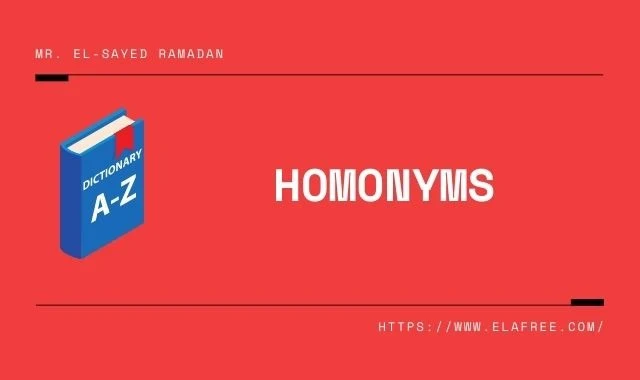Homonyms
Ever stumbled upon words that sound exactly the same but have entirely different meanings? Welcome to the fascinating world of homonyms! These linguistic chameleons can transform your understanding of language and add a layer of complexity to your communication skills.
Imagine this: You’re in a dense forest, and you spot a bear. You can’t bear the sight and run away. Here, ‘bear’ is a homonym, a word that sounds the same but has different meanings.
Learning Objectives
In this lesson, you will focus on the following objective:
Vocabulary: Understanding homonyms.
Vocabulary: Understanding homonyms.
Homonyms
Homonyms are different words that sound alike and may be spelled alike. Homonyms are distinct from multiple-meaning words, which are single words with more than one meaning.
In sentences 1–2 below, bear and bear are homonyms, because they are different words:
1. I can’t bear it.
2. The bear growled.
In sentences 4–5, bear is one word with two different meanings:
4. I can’t bear it.
5. I’m going to bear a child.
In sentences 1–2 below, bear and bear are homonyms, because they are different words:
1. I can’t bear it.
2. The bear growled.
In sentences 4–5, bear is one word with two different meanings:
4. I can’t bear it.
5. I’m going to bear a child.
Literature Connection
Homonyms are different words that sound alike but have different meanings and sometimes different spellings. For example, hail can be either of two completely different words.
Homonyms are different words that sound alike but have different meanings and sometimes different spellings. For example, hail can be either of two completely different words.
" Often the white travelers would hail me, but more often I hailed them, and asked, ' don't you want me to go a piece of the way with you?'"
—Zora Neale Hurston , from Dust Tracks on a Road
Here hail means "to greet" Hail as a noun means "pellets of ice."
The English language is full of homonyms. Here is a sample list.
| Word | Meaning | Example |
|---|---|---|
bear bear |
an animal to endure |
The brown bear walked right into our campsite. The entire team must bear the burden of defeat. |
bank bank |
a mound or border a place to keep money |
We stood on the river’s bank and watched the current. My bank informed me my account was overdrawn. |
| break brake |
to crack, split, or smash to stop a movement |
Enslaved people endeavored to break their bonds. The negligent driver failed to brake for the pedestrian. |
hear here |
to listen in this place |
In the village, we could hear the pealing church bells. I am resolved to remain here until I am evicted. |
piece peace |
a part of something tranquility | I completed the last piece of the puzzle. In the midst of war, people long for peace. |
holy wholly holey |
sacred completely full of holes |
The pilgrims consider the shrine to be holy. I am not wholly convinced of your arguments. My holey socks are in need of repair. |
<->
Homonyms Practice
Select the correct homonym to fit each sentence. Consult a dictionary if you need help.
Homonyms Quiz
FAQs: Unraveling the World of Homonyms and Homophones
Q: How do homonyms and homophones differ from each other?
A: Imagine walking into a world where words are like twins. Homonyms are those twins that look and sound alike but have their own personalities, meaning they share both pronunciation and spelling but have different meanings. Homophones, on the other hand, are like twins separated at birth; they sound identical but have chosen different paths in life, meaning they're spelled differently but sound the same.
Q: Could you give me a taste of a homonym or homophone?
A: Sure thing! Let's grab a classic from the English language closet. "Bear" is a fantastic example that can either mean the big furry creature that loves honey or the verb to carry or endure something. It's a homonym that's as versatile as a Swiss Army knife!
Q: Is "duck" playing a double role as a homophone or a homonym?
A: "Duck" dives into the pond of homonyms! It can mean the action of lowering your head quickly (you know, to avoid that low-hanging branch) or refer to the quacking bird that waddles around. So, "duck" is showing off its versatility by fitting different scenarios under one spelling and sound.
Q: Do you have examples of homonyms used in sentences?
A: Absolutely, let's sprinkle some context on homonyms to see them shine! For instance, "I couldn’t bear the thought of going through that bear-infested forest." Here, "bear" is your homonym, working double shifts as both a verb and a noun to bring the sentence to life. It's like a word wearing multiple hats, adapting to the vibe of the sentence.

